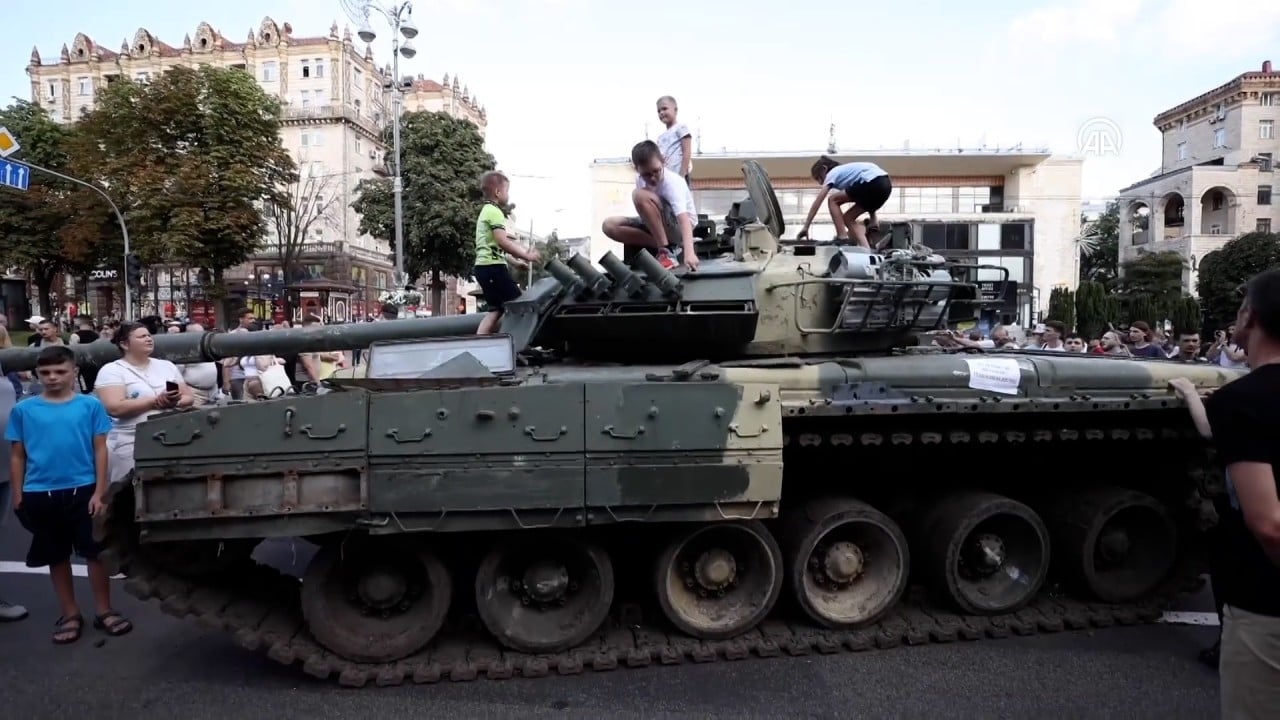
Ukraine war: Russia targets Zaporizhzhia region as Kyiv bans Independence Day festivities
- The State Department urged US citizens to leave Ukraine due to threats to their safety
- Ukraine said Russian troops shelled the Zaporizhzhia nuclear power plant, damaging transformers and temporarily cutting off a communication line
Russia carried out artillery and air strikes in the Zaporizhzhia region, Ukraine’s General Staff said on Tuesday, where fighting near Europe’s largest nuclear power plant has raised fears of a catastrophic nuclear incident.
The attacks come ahead of Ukraine’s Independence Day on Wednesday commemorating freedom from Soviet rule, with Kyiv banning public celebrations citing a threat of more attacks.
Near front lines in the south of the country, Ukraine said Russia fired artillery and conducted air strikes in several towns in the Zaporizhzhia region, were Russian forces captured the nuclear power plant soon after they invaded on February 24.
Artillery and rocket fire near the Zaporizhzhia nuclear reactor complex, on the south bank of the Dnipro River, has led to calls for the area to be demilitarised.
Ukrainians living nearby voiced fears shells could hit one of the plant’s six reactors, with disastrous consequences.
US warns of fresh Russian strikes near civilians
Russia is preparing to launch renewed strikes against Ukraine’s government facilities and infrastructure in the coming days, said a US official, citing intelligence reports. The official, who asked not to be identified, warned that a new wave of attacks would pose an increased risk to civilian populations in Ukraine.
The State Department urged US citizens to leave the country due to threats to their safety, according to a statement posted on the website of the American embassy in Ukraine.
US officials met with Russian Ambassador Anatoly Antonov at the State Department on August 18 to warn against escalation in Ukraine and to call on Russia to halt military operations around Ukrainian nuclear facilities, according to a department spokesperson who briefed reporters on condition of anonymity.
Antonov has characterised the meeting as focused on visas for Russian diplomats to the annual United Nations General Assembly in September, while the US said the focus was on the war in Ukraine generally and on the status of the Zaporizhzhia nuclear facility in particular.
Daughter of ‘Putin’s brain’ ideologist killed in car blast in Moscow
Gatherings banned ahead of Independence day
Ukrainian President Volodymyr Zelensky has warned that Moscow could try “something particularly ugly” in the run-up to Wednesday’s 31st independence anniversary, which also marks half a year since Russia invaded.
Fearing renewed rocket attacks, authorities in Kyiv moved to ban public events related to the independence anniversary from Monday until Thursday. The capital is far from the front lines and has only rarely been hit by Russian missiles since Ukraine repelled a ground offensive to seize the capital in March.
Putin calls Dugina killing ‘dastardly’
The car bombing that killed Darya Dugina was a “dastardly, brutal crime,” Putin said in a message of condolence to her father, a far-right political theorist who’s an outspoken advocate of Russia’s war in Ukraine.
Putin’s message, posted on the Kremlin’s Telegram channel, came after Russia’s Federal Security Service accused Ukrainian special services of orchestrating the attack on Saturday. Ukraine has denied any role in the killing.
Officials at Russian state television plan a memorial ceremony at Moscow’s main TV centre on Tuesday for Dugina, who appeared as a commentator on its channels, state-run Tass reported.
UN appoints fact-finding mission on prisoner killings
The United Nations picked staff to investigate and ascertain the facts behind a missile strike on a Russia-held camp in the occupied Ukrainian town of Olenivka last month that resulted in dozens of Ukrainian prisoners of war killed.
United Nation Secretary-General Antonio Guterres appointed retired Lieutenant General Carlos Alberto dos Santos Cruz of Brazil to lead the fact-finding mission, with Ingibjörg Sólrún Gísladóttir of Iceland and Issoufou Yacouba of Niger as the other members.
While Ukraine and Russia have traded blame for the attack, European intelligence has dismissed Moscow’s claims that ammunition provided by the US was used to hit the facility after analysing damage captured in satellite images.
UNICEF announces toll of child casualties
At least 972 children in Ukraine have been verified as killed or injured since the war escalated nearly six months ago, an average of more than five children each day, UNICEF Executive Director Catherine Russell said in an emailed statement.
“We believe the true number to be much higher,” she said. UNICEF estimates that one in 10 schools in Ukraine have been damaged or destroyed.
Ukraine says almost 9,000 soldiers killed
Ukraine’s top army Commander Valeriy Zaluzhnyi told a televised forum for veterans that almost 9,000 servicemen have been killed fighting against Russia’s invasion.
The toll was an increase since April, when Zelensky said Ukraine had lost as many as 3,000 soldiers since the start of the war. Speaking at the same forum as Zaluzhnyi, the president said that about 1 million Ukrainians are serving in the army and in other security agencies.
It’s rare for either Russia or Ukraine to make statements on their own casualties, while they frequently cite numbers of killed and wounded for the enemy that may be inflated.
US rejects Ukraine demand for blanket visa ban on Russians
EU’s Borrell rejects calls to ban Russians
The European Union’s foreign policy chief pushed back against a proposal by some member states bordering Russia to prevent the nation’s citizens from entering the bloc, as its foreign ministers prepare to discuss stopping tourist visas next week.
“To forbid the entrance to all the Russians is not a good idea,” Josep Borrell said at a conference in Spain. “We have to be more selective.” The EU is set to discuss banning travel visas for Russian tourists at a gathering of the bloc’s foreign ministers in Prague this month, with countries such as Estonia, Latvia and Finland urging a bloc-wide ban, while German Chancellor Olaf Scholz has urged caution.
Additional reporting Associated Press


